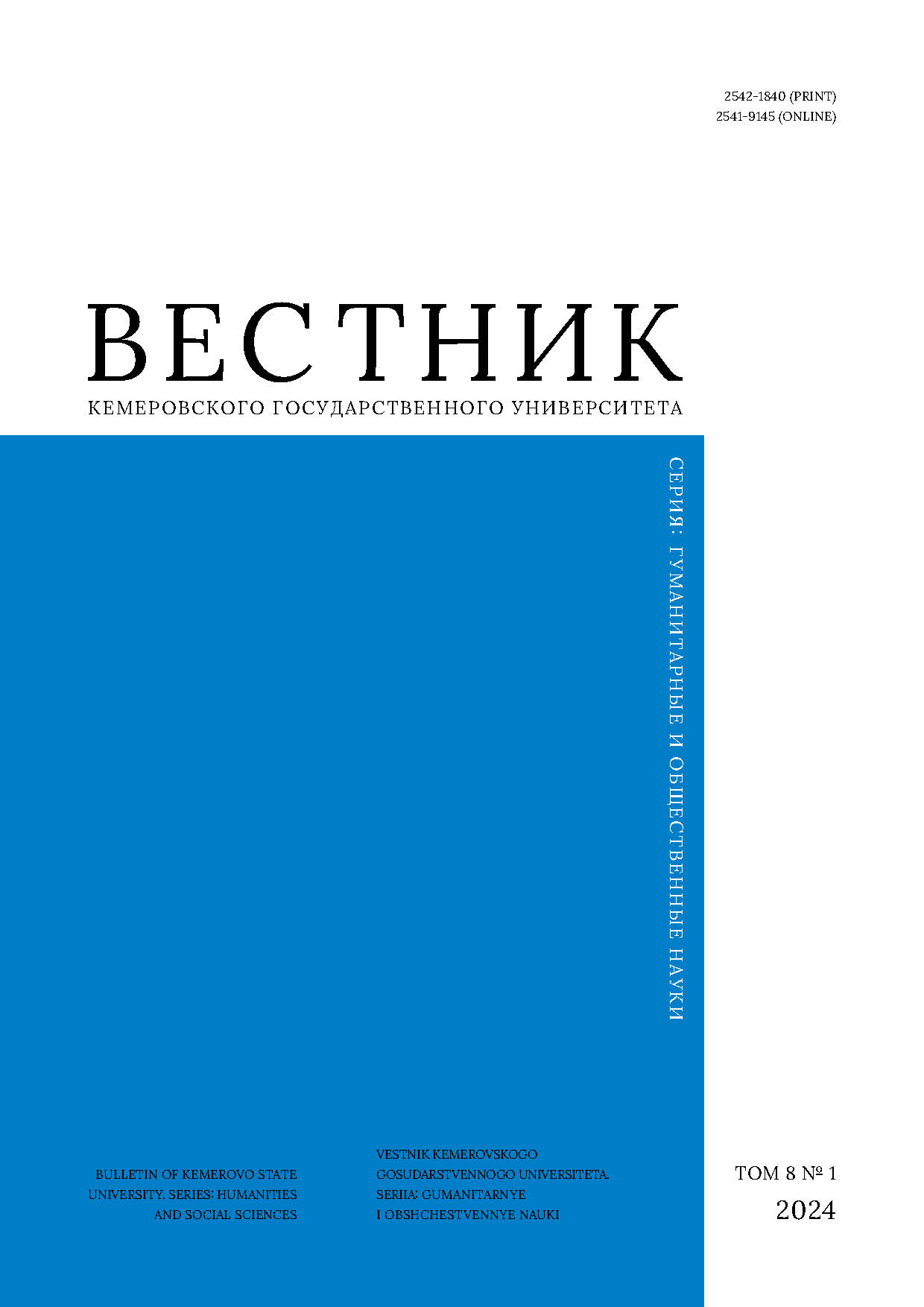N. F. Katanov Khakass State University
Kyzyl, Russian Federation
This article features monolingualism in the Tuvan-Russian bilingual community. Language acquisition, especially when it is the second language, follows psychological rather than linguistic patterns, e.g., assimilation and imitation. In this research, we made an attempt to study the individual psychological features of speech as a higher mental function. Our respondents positioned themselves as monolinguals and denied that they had an opportunity to practice their second language. The research objective was to identify and record some linguistic competencies in the Tuvan language in Russian monolinguals, as well as to conduct a qualitative analysis of their language skills. We used such diagnostic methods as clinical interview, observation, and questionnaires to obtain data on some linguistic competencies in the second non-native language spoken by monolinguals. While profiling a typical linguistic personality, we recorded some linguistic competencies in the second language that the respondents were not aware of. In the linguistic environment of the Tyva Republic, monolingualism is possible only at the early stages of cognitive development. In ontogenesis, it transforms into psychological bilingualism, and then into multilingualism. The Russian-speaking monolinguals of the Tuva Republic develop their speech competencies in a natural bilingual environment. As a result of the natural bilingual environment, Russian-speaking monolinguals develop unconscious speech competencies that actually make them bilinguals.
language, speech, psycholinguistics, bilingualism, monolinguals, language interferences, Tuvan language Citation: Litskevich E. Y. Speech Competencies in Russian-Speaking Monolinguals of the Tyva Republic in the
1. Morozova I. S., Bulgakova E. O. Joint mental activity and its application in teaching practice. Vestnik KemGU, 2007, (1): 20-25. (In Russ.) https://www.elibrary.ru/ltxksd
2. Bogus M. B. Effect of bilingualism on the intellectual development of students’ personality. The bulletin of Adyghe State University. Series 3: Pedagogy and Psychology, 2008, (7): 40-44. (In Russ.) https://www.elibrary.ru/kglpfr
3. Emelyanova Ya. B. Different approaches to bilingualism effect evaluation for personality's cognitive development. Vestnik Cheljabinskogo gosudarstvennogo pedagogicheskogo universiteta, 2010, (2): 91-102. (In Russ.) https://www.elibrary.ru/mqphch
4. Novikova D. A., Metlasova T. M. Natural and artificial bilingualism. Linguistic and cultural contacts: linguistic and didactic aspects: Proc. IV Intern. Sci.-Prac. Conf., Saratov, 14-15 Nov 2019. Saratov: Sarat. ist-k, 2019, 221-224. (In Russ.) https://www.elibrary.ru/duujmm
5. Kosmina M. A. Bilingualism's influence on formation of language competence of 6-7-year-old children. Izvestia: Herzen University Journal of Humanities & Sciences, 2007, (20): 307-311. (In Russ.) https://www.elibrary.ru/kohvah
6. Jagapirova E. Y. Linguistic personality development in children in conditions of natural and artificial bilingualism. Relevant issues of modern science: Proc. IV Intern. Sci.-Prac. Conf., Alushta, 27-30 Apr 2015. Stavropol: SU, 2015, vol. 1, 172-174. (In Russ.) https://www.elibrary.ru/txygyn
7. Nikitenko Y. S. Cognitive and socio-cultural aspects of bilingualism. Obrazovanie ot "A" do "Ia", 2022, (2): 59-61. (In Russ.) https://www.elibrary.ru/tdqcss
8. Makhankova N. A., Morozova I. S. Speech activity of Shorians in bilingual conditions. Vestnik KemGU, 2007, (1): 14-20. (In Russ.) https://www.elibrary.ru/ltxkrt
9. Tsvetkova T. K. Theory of bilingualism as the basis of modern linguistic didactics. Moscow: Sputnik, 2020, 117. (In Russ.) https://www.elibrary.ru/qlfxdb
10. Simonov K. V. Definition and typology of the concept of bilingualism. Relevant issues and modern technologies of teaching foreign languages in non-specialized universities: Proc. XIV All-Russian Sci.-Prac. Conf. with Intern. participation, Voronezh, 19-20 Mar 2021. Voronezh: Nauch. kn., 2021, 220-224. (In Russ.) https://www.elibrary.ru/rstshf
11. Savitsky V. M. Bilingualism and non-native language profeciency: a qualitative difference. Russian Journal of Bilingualism Studies, 2021, (1): 11-20. (In Russ.) https://www.elibrary.ru/rpwkaa
12. Nishchimova E. A., Malookaya J. U. Ideas of bilingualism development in foreign literature and their effect upon foreign language study. Vestnik Stavropolskogo gos. un-ta, 2011, (2): 42-49. (In Russ.) https://www.elibrary.ru/nyaujn
13. Rosenzweig V. Y. Language contacts. Leningrad: Nauka, 1972, 80. (In Russ.)
14. Tsvetkova L. S. Neuropsychological rehabilitation in patients. Speech and intellectual activity. 2nd ed. Moscow: MPSI, 2004, 324. (In Russ.) https://www.elibrary.ru/qlfxdb
15. Znamenskaya T. A. Problems of bilingualism and its effect on the linguistic personality. Innovatsionnye proekty i programmy v obrazovanii, 2014, (3): 42-46. (In Russ.) https://www.elibrary.ru/sewrwb
16. Sarkisov E. E. On the problem of clear bilingualism, or does bilingualism exist beyond interference? Current problems of English-language philology, linguistics and intercultural communication: collection of articles, ed. Nikolaev S. G. Rostov-on-Don: Profpresslit, 2022, 188-199. (In Russ.) https://www.elibrary.ru/lklikj
17. Verescagin Ye. M. Psychological and methodological characteristics of bilingualism. Moscow-Berlin: Direkt-Media, 2014, 162. (In Russ.) https://www.elibrary.ru/ylqlzh
18. Shcherba L. V. Language system and speech activity. Leningrad: Nauka, 1974, 427. (In Russ.)
19. Ilyin E. P. Emotions and feelings. 2rd ed. St. Petersburg: Piter, 2011, 782. (In Russ.) https://www.elibrary.ru/uymwzb
20. Sartbekova N. K., Abakulov R. A. To the issue of bilingualism in Kyrgyzstan. Science and innovation technologies, 2023, (2): 231-237. (In Russ.) https://doi.org/10.33942/sit042327 EDN: https://elibrary.ru/YZLXIC
21. Aden Zh. Sh., Sansyzbayeva S. K. Bilingualism as a phenomenon of transcultural communication. Keruen, 2022, 76(3): 304-319. (In Russ.) https://doi.org/10.53871/2078-8134.2022.3-26 EDN: https://elibrary.ru/JHNWJS
22. Dongak Ch. B. Tuvan-Russian bilingualism in discourse representation. Kazan science, 2021, (11): 168-171. (In Russ.) https://www.elibrary.ru/wvnsnb
23. Kolmogorova A. V., Malikova A. V. Subjective and objective factors of bilingualism in the emotional text comprehension in Tuvan-Russian bilinguals. Vestnik KemGU, 2022, 24(6): 735-743. (In Russ.) https://doi.org/10.21603/2078-8975-2022-24-6-735-743 EDN: https://elibrary.ru/WMITGX
24. Asmolov A. G. Personality psychology: cultural and historical understanding of human development. 3rd ed. Moscow: Smysl, 2007, 526. (In Russ.) https://www.elibrary.ru/qxqimt
25. Kravtsov G. G. Personality in cultural and historical psychology. Cultural-Historical Psychology, 2006, (1): 18-25. (In Russ.) https://www.elibrary.ru/ltwhff


















